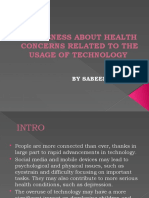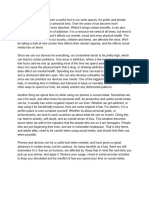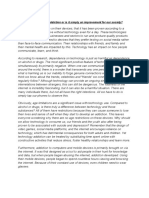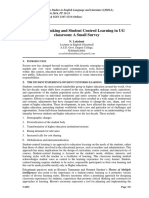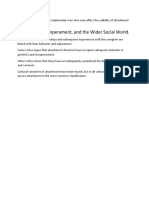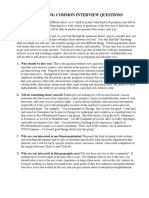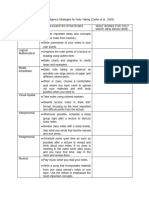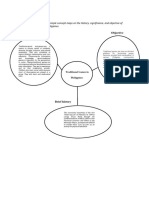The Hidden Costs of Technology: Are We Paying Too Much?
In today’s fast-paced world, technology has become a constant companion in our lives. We use our phones
to connect with friends, get the latest news, and even manage our daily tasks. But as technology becomes
more and more present, are we really aware of how it affects us?
How Technology Affects Our Bodies
Staring at screens for long periods might seem harmless, but it can actually have a serious impact on our
bodies. One of the most common problems is eye strain. Spending hours looking at a screen can make our
eyes feel tired, dry, and even blurry. Sometimes, it can also cause headaches.
But it’s not just our eyes that suffer. Many people experience neck and back pain because of poor posture
while using devices. This is often called “text neck,” and it happens when we bend our heads down to look
at our phones. Additionally, spending too much time sitting down with a device can lead to lack of physical
activity, which increases the risk of obesity and heart problems.
Another big issue is sleep disturbance. Screens emit blue light that affects the production of melatonin, a
hormone that helps us sleep. As a result, people who use their phones before bed often find it harder to
fall asleep and stay asleep.
The Impact on Our Minds
Technology also changes the way our brains work. One major problem is attention difficulties. Constant
notifications and multitasking make it hard to concentrate on one thing for a long time. This can affect
school, work, and even simple conversations.
There is also evidence that technology use can cause memory problems. Relying on our devices to
remember things makes it harder for our brains to store information naturally. Some experts even warn
that too much screen time in children and teenagers could affect their brain development, making it
harder for them to focus and solve problems.
Another risk is digital addiction. Many apps and social media platforms are designed to keep us hooked by
giving small rewards, like likes and comments. This triggers a release of dopamine, the “feel-good”
chemical in our brains, making us want to keep coming back for more.
Social Consequences
Even though technology connects us to people worldwide, it can also make us feel isolated from those
around us. Spending too much time on devices can weaken our face-to-face communication skills and
make us feel lonely. Social media, in particular, can negatively impact mental health, leading to anxiety,
low self-esteem, and even depression.
Finding a Balance
Technology itself is not the problem—it’s how we use it. To minimize negative effects, it’s important to set
healthy boundaries. Try to take regular breaks from screens, especially before bed. Make time for offline
activities, like sports or hobbies, to help balance your digital life.
Conclusion
Technology can make our lives easier and more connected, but it’s essential to remember that too much of
a good thing can be harmful. By being mindful of how we use our devices, we can protect our health and
keep our relationships strong.
1. Read the text and write true or false. Correct the false ones.
a. Eye strain is caused by poor posture while using devices.
b. Blue light from screens can affect sleep.
c. Digital addiction is caused by a lack of sleep.
d. Social media always has a positive impact on mental health.
e. Multitasking can make it harder to concentrate.
� 2. Match each term with its correct definition:
1- Eye strain d) A condition where people feel the need to
2- Neck and back pain constantly check or use their devices.
3- Text neck e) The ability of the brain to grow and improve its
4- Lack of physical activity cognitive functions, especially in children.
5- Sleep disturbance f) The discomfort or pain caused by staying in one
6- Attention difficulties position while using a device.
7- Memory problems g) Difficulty focusing on one task due to constant
8- Brain development distractions.
9- Digital addiction h) Limits set to control screen time and prevent
10- Isolated negative effects of technology.
11- Face-to-face communication skills i) A lack of movement that can lead to health
12- Mental health problems like obesity.
13- Healthy boundaries j) The ability to regulate emotions and stress
while maintaining a balanced state of mind.
Definitions: k) A specific type of neck pain caused by looking
a) The ability to interact and communicate down at a phone for long periods.
directly with others in person. l) Difficulty remembering information due to
b) Feeling alone or disconnected from others over-reliance on technology.
despite being online. m) Tired or irritated eyes caused by looking at a
c) Trouble sleeping due to screen exposure, screen for too long.
especially from blue light.
3. Answer the next questions in full sentences
a. What are some physical problems caused by excessive phone use?
b. How does technology affect our concentration and memory?
c. Why is social media sometimes harmful to mental health?
d. What is digital addiction, and why does it happen?
e. How can we balance technology use and well-being?
f. What are some positive and negative aspects of using technology?
g. How do you feel when you spend too much time on your phone?
h. Can you think of examples of how technology improves our lives?





